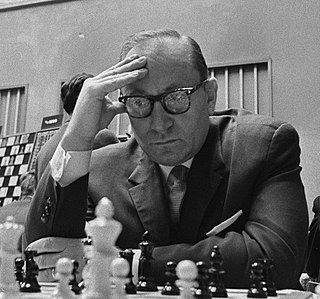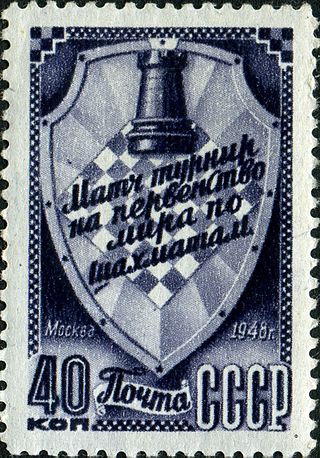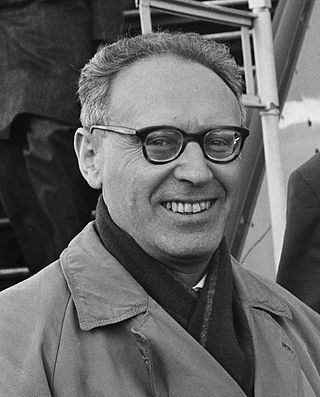
David Ionovich Bronstein was a Soviet chess player. Awarded the title of International Grandmaster by FIDE in 1950, he narrowly missed becoming World Chess Champion in 1951. Bronstein was one of the world's strongest players from the mid-1940s into the mid-1970s, and was described by his peers as a creative genius and master of tactics. He was also a renowned chess writer; his book Zurich International Chess Tournament 1953 is widely considered one of the greatest chess books ever written.

Vasily Vasilyevich Smyslov was a Soviet and Russian chess grandmaster, who was the seventh World Chess Champion from 1957 to 1958. He was a Candidate for the World Chess Championship on eight occasions. Smyslov twice tied for first place at the USSR Chess Championships, and his total of 17 Chess Olympiad medals won is an all-time record. In five European Team Championships, Smyslov won ten gold medals.

Paul Keres was an Estonian chess grandmaster and chess writer. He was among the world's top players from the mid-1930s to the mid-1960s, and narrowly missed a chance at a World Chess Championship match on five occasions. As Estonia was repeatedly invaded and occupied during World War II, Keres was forced by the circumstances to represent the Soviet Union and Nazi Germany (1941–44) in international tournaments.

Alexander Alexandrovich Kotov was a Soviet chess grandmaster and author. He was a Soviet chess champion, a two-time world title Candidate, and a prolific writer on the subject of chess. Kotov served in high posts in the Soviet Chess Federation, and wrote most of his books during the Cold War. The importance and breadth of Kotov's work rank him among the all-time greats in this field.

Reuben C. Fine was an American chess player, psychologist, university professor, and author of many books on both chess and psychology. He was one of the strongest chess players in the world from the mid-1930s until his retirement from chess in 1951. He was granted the title of International Grandmaster by FIDE in 1950, when titles were introduced.

Samuel Herman Reshevsky was a Polish chess prodigy and later a leading American chess grandmaster. He was a contender for the World Chess Championship from the mid-1930s to the mid-1960s: he tied for third place in the 1948 World Chess Championship tournament, and tied for second in the 1953 Candidates tournament. He was an eight-time winner of the US Chess Championship, tying him with Bobby Fischer for the all-time record.

Salomon Mikhailovich Flohr was a Czechoslovak and Soviet chess player and writer. He was among the first recipients of the title International Grandmaster from FIDE in 1950. Flohr dominated many tournaments of the pre-World War II years, and by the late 1930s was considered a contender for the World Championship. However, his patient, positional style was overtaken by the sharper, more tactical methods of the younger Soviet echelon after World War II.

Miguel Najdorf was a Polish–Argentine chess grandmaster. Originally from Poland, he was in Argentina when World War II began in 1939, and he stayed and settled there. He was a leading world player in the 1940s and 1950s, and is also known for the Najdorf Variation, one of the most popular chess openings.

Anders Gideon Tom Ståhlberg was a Swedish chess player. He was among the inaugural recipients of the title International Grandmaster from FIDE in 1950.
The Candidates Tournament is a chess tournament organized by FIDE, chess's international governing body, since 1950, as the final contest to determine the challenger for the World Chess Championship. The winner of the Candidates earns the right to a match for the World Championship against the incumbent world champion.

László Szabó was a Hungarian chess player. He was awarded the title of International Grandmaster in 1950, when it was instituted by FIDE.

Igor Zakharovich Bondarevsky was a Soviet Russian chess player, trainer, and chess author. He held the title of Grandmaster in both over-the-board and correspondence chess. Bondarevsky shared the 1940 Soviet title, and later coached World Champion Boris Spassky.

Alexander Markovich Konstantinopolsky was a Soviet chess player, trainer and writer. He was a five-time champion of Kiev, and trained the world title challenger David Bronstein from a young age. He was awarded the title of International Master (IM) by FIDE in 1950, won the first Soviet Correspondence Chess Championship in 1951, earned the IM title at correspondence in 1966, and earned the title of Honorary Grandmaster in 1983.

The 1948 World Chess Championship was a quintuple round-robin tournament played to determine the new World Chess Champion following the death of the previous champion Alexander Alekhine in 1946. The tournament marked the passing of control of the championship title to FIDE, the International Chess Federation which had been formed in 1924. Mikhail Botvinnik won the five-player championship tournament, beginning the era of Soviet domination of international chess that would last over twenty years without interruption.

At the World Chess Championship 1963, Tigran Petrosian narrowly qualified to challenge Mikhail Botvinnik for the World Chess Championship, and then won the match to become the ninth World Chess Champion. The cycle is particularly remembered for the controversy surrounding the Candidates' Tournament at Curaçao in 1962, which resulted in FIDE changing the format of the Candidates Tournament to a series of knockout matches.

A World Chess Championship was played between Mikhail Botvinnik and Vasily Smyslov in Moscow from March 16 to May 13, 1954. Botvinnik had been World Champion since 1948 and had successfully defended the title in 1951, while Smyslov earned the right to challenge by winning the 1953 Candidates tournament.

A World Chess Championship was played between Tigran Petrosian and Boris Spassky in Moscow from April 9 to June 9, 1966. Petrosian won.
The below is a list of events in chess in the year 1945.
The 1948 Interzonal tournament was a major qualification event for the 1951 World Chess Championship, held in Saltsjöbaden, Sweden from 16 July to 14 August in 1948. It was the first Interzonal tournament organised by FIDE, which was at the time emerging as the game's international governing body. The 20 player round robin tournament was won by David Bronstein, who along with seven other players advanced to the 1950 Candidates Tournament.


















